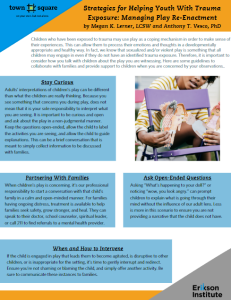During times of political upheaval and increased violence, our obligation to be informed citizens can feel at odds with our obligation to protect the children in our care. It’s difficult to maintain the best practices of avoiding the presence of television/radio/podcasts when there is so much information that feels critical to take in. Add to that comments from families and children, and it can feel like there’s nothing else to focus on.
Our work is not apolitical. Decisions about funding, licensing requirements, and more decisions that apply to child care are made at the state level and are becoming federal questions as well. Our work is political, but our responsibility to children defies party lines or beliefs and must focus on their needs.
How can a provider respond appropriately to children’s questions and concerns? What do young children need when the news is frightening and adults are responding strongly?
Root your responses in reassurance: the children need to know they are safe, and you and their families will keep them safe.
Hearing about real-world violence is scary; young children will naturally feel unsafe, even if they are very removed from the situation.
When older children really want to talk out what they’ve heard, this includes emotional/ideological safety. It’s very likely that children and families have a range of opinions that will be expressed many different ways. Maintaining emotional and ideological safety allows for different viewpoints and centers the idea that while there may be many different interpretations of events, the safety of each individual will not be compromised by expression of associated hate speech.
Avoid showing photos or videos of the events or listening to or viewing media where they’re being depicted and discussed.
Even when children are interested and want to talk about what they’ve heard, it can be overwhelming and frightening for children to view depictions of violence. As we know, children are always listening. Save your own information for after hours.
Find a way to move on from the conversation productively.
Children (and adults!) can get overwhelmed easily by ruminating on events outside of their control. Allow children to play out their experiences and talk as they need to but be prepared to interrupt advantageously when you see signs that it’s getting overwhelming. Bring their focus back to how they can feel safe and help others feel safe, and what they need to participate in community effectively. Preschoolers need the empowerment that comes from being a helper; how can they help in your space?
Redirecting early on can reinforce to children the idea that the world is frightening, and even adults are uncomfortable with the topic at hand. Being a sounding board and then helping the children move on sends the message that they are heard, and the adults can keep them safe.
Be prepared for play to emerge from current events.
Young children process the world through play, which can be challenging when they’re hearing and seeing violence. Know that processing through play is healthy, even when it involves themes that adults would prefer to avoid. Observe closely. Notice when play is becoming disruptive to other children and prepare to step in if that happens to offer a break to the affected children.
For more resources on talking about current events with children, see:
Discussing Race, Racism and Police Violence | Learning for Justice
Talking with Students About Shocking or Disturbing News | Common Sense Education
How to talk to kids about scary news : NPR
Gun Violence and Children: Practical Ways to Provide Mental Health Support, Part One
When providers encounter children engaging in play with troubling themes, it’s important to understand how to interact with the children in their play, when and how to interrupt, and how to talk to families about our observations. This one-page downloadable/printable document from mental health professionals Megan Lerner, LCSW and Anthony T. Vesco, PhD, can help prepare you for these difficult situations.
The NCTSN offers information about many types of trauma, treatments, and other related topics. There are specific resources for parents and care providers as well as training. The mission of NCTSN is to raise the standard of care and improve access to services for traumatized children and families, as well as to raise public awareness about childhood trauma and stress. This page has resources for caregivers of young children who have been exposed to trauma.
“The most important adults in a young child’s life are caregivers and relatives. These adults can help reestablish security and stability for children who have experienced trauma.”

